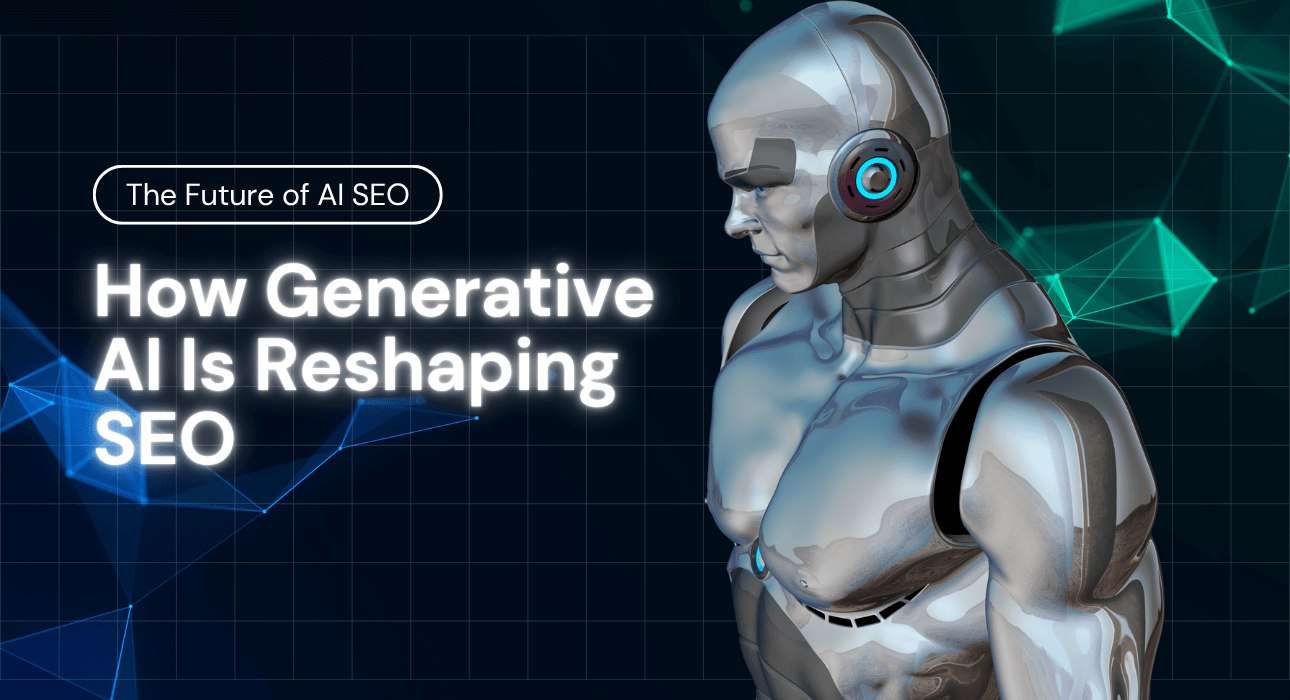Cursor
mode
SEO PLUS GEO
How Generative AI Is Reshaping SEO?

Generative AI is not just a technological advancement — it's a game-changer for search engine optimization. From transforming how content is created to redefining how users receive answers, Generative AI is fundamentally reshaping the way SEO works. It enables search engines to provide context-rich, conversational responses and demands a new approach to content strategy, optimization, and visibility in AI-first search results.
Content Creation at Scale
Generative AI allows marketers and SEOs to produce high-quality, optimized content faster than ever. It automates ideation, outlines, writing, and even multimedia, enabling brands to maintain a consistent publishing schedule.
AI-Assisted Content Generation
Tools like ChatGPT, Jasper, and Copy.ai help generate blog posts, product descriptions, and metadata that align with user search intent and SEO best practices.
Consistent Brand Voice
Generative AI models can be trained to match a brand's tone and style, ensuring all content — whether blog posts or landing pages — feels consistent and professional.
Localized and Personalized Content
AI makes it easier to scale content for different audiences, locations, and buyer personas by adapting messages automatically to various segments.
Optimizing for Conversational Search
Search is becoming more question-based and conversational. Generative AI understands and mirrors this, pushing SEO professionals to optimize content for natural language and multi-step queries.
Long-Tail Keyword Targeting
Generative AI enables content that targets highly specific and contextual queries — improving chances of ranking in AI-generated summaries and responses.
Natural Language Formatting
Formatting content in question-and-answer formats, bullet lists, and conversational tone makes it easier for AI to extract and display the information directly.
Better Alignment with User Intent
By mimicking how humans search and respond, generative AI encourages content that addresses true user needs, not just keywords.
- AI SEO +GEO Services
- SEO Services
- Social Media Services
- Website Services
- Ads & Campaign Services
- Reach Us
Search Generative Experience (SGE) Inclusion
With the rise of SGE, traditional blue-link rankings are no longer the only goal. SEO strategies now need to optimize for inclusion in AI-generated answers.
Structured and Answer-Driven Content
Content that directly answers questions in structured formats — like FAQs and short summaries — is more likely to be picked up in generative search snippets.
Entity-Based Optimization
AI search engines look for known entities and relationships. Generative SEO focuses on clearly defining people, brands, topics, and services through schema markup and structured text.
Supporting Sources and Citations
AI-generated responses often cite authoritative content. Providing well-referenced, data-backed content increases the chance of being credited in AI outputs.
Technical and On-Page SEO Evolution
Generative AI is changing how technical SEO is implemented, prioritizing accessibility, crawlability, and structured data to make content more machine-readable.
Schema Markup Integration
Rich snippets, FAQs, HowTos, and product schema help search engines — and AI systems — understand your content structure and purpose more accurately.
Improved UX Signals Through AI
Generative SEO relies on good UX. AI tools help test layouts, speed, and engagement to improve dwell time and page interaction metrics.
Dynamic Content Optimization
With AI, content updates are driven by performance data. Pages are adjusted in real-time for keywords, engagement, and intent, keeping content fresh and competitive.
Conclusion – The AI Revolution in SEO Strategy
Generative AI is leading a revolution in SEO by shifting the focus from keyword-based strategies to experience, intent, and conversational relevance. It empowers marketers to create content faster, optimize smarter, and connect better with both users and search engines. For brands aiming to stay ahead, embracing AI-driven SEO practices is no longer optional — it’s essential. The future of search belongs to those who build for machines that think like humans.



